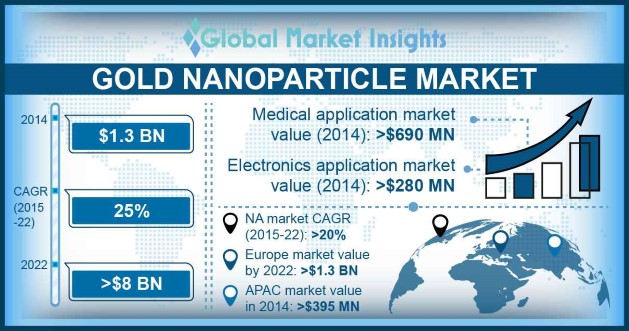Home > Chemicals & Materials > Advanced Materials > Nanomaterials > Gold Nanoparticles Market
Gold Nanoparticles Market Size
- Report ID: GMI358
- Published Date: Mar 2016
- Report Format: PDF
Gold Nanoparticles Market Size
Gold Nanoparticles Market size was over USD 1.3 billion in 2014 and may expect consumption at over 25% up to 2022.

Increasing product demand from wide range of application industries such as healthcare, photometry, and cosmetics, pertaining to growing per capita income may trigger stimulate gold nanoparticles market growth. Gold nanoparticles are extensively used in electronic products such as electronic chips, printable inks and transistors. These products are witnessing growing adoption in chip design owing to rising trend of miniaturization of electronics. European market for consumer electronics was over USD 111 billion in 2018 owing to rising demand for high performance consumer electronics on account of changing perceptions towards latest technological advances may encourage product demand.
Global gold nano particles consumption is projected to reach over 20,000 kilo grams by 2022. These particles find extensive usage as catalysts in redox reactions, carbon-carbon coupling, organic reactions and shows significant activity at ambient temperature thereby improving reaction selectivity. They show improved activity when used as a mixed precious metal catalyst. These products can be used either in colloidal or powdered solid form which may stimulate market share.
| Report Attribute | Details |
|---|---|
| Base Year: | 2014 |
| Gold Nanoparticles Market Size in 2014: | 1.3 Billion (USD) |
| Forecast Period: | 2015 to 2022 |
| 2022 Value Projection: | 8 Billion (USD) |
| Historical Data for: | 2012 to 2014 |
| No. of Pages: | 90 |
| Tables, Charts & Figures: | 64 |
| Segments covered: | Application and Region |
Global gold nanoparticles market demand was valued at over USD 1.3 billion in 2014. Increasing prevalence of various disorders such as Parkinson’s, Alzheimer’s, cardiovascular diseases, neuropathy, and osteoporosis is changing consumer perceptions towards alternate and exotic medicinal products. These particles improve wound healing mechanism by exhibiting antioxidative effects and promote the spread of dermal fibroblasts, which restores epidermal tissues. In addition, these products retain beta-amyloid fibrils which prevents mental decline and contribute to Alzheimer’s treatment which may encourage product demand.
Rising concerns of cell toxicity, mutagenicity or genotoxic effects of gold nanoparticle usage on humans may hamper market growth. These nanoparticles have been associated with toxicological effects such as apoptotic cell death and embryo growth inhibition on account of their high surface-to-volume ratio which increases their catalytic properties. Manufacturers are trying to overcome this by developing novel extraction methods to reduce the impact of side effects. Also, companies are trying to clamp down the effect of capping agents by developing new refining and purification techniques which may have positive impact on market growth.
